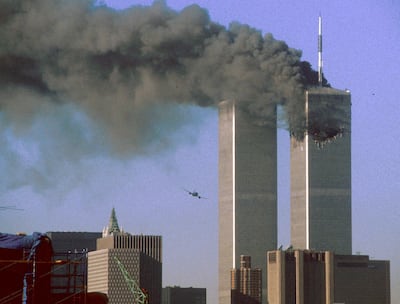This week I've been involved in discussions with shortlisted candidates for the 2020-21 UAE programme of the Rosalynn Carter Fellowships for Mental Health Journalism.
The fellowship aims to develop a cohort of international journalists who can effectively report on the mental health landscape and is named after the co-founder of the Carter Centre in the US, a not-for-profit, non-governmental organisation.
More than 200 reporters and editors from around the world have received mental health journalism fellowships since the scheme's inception in 1996 and The National is responsible for the administration of the programme locally. This year's applicants are of an exceptionally high calibre, presenting tough choices for those tasked with making the final selections.
Next week the two newest UAE fellows will be announced. The work these two journalists will undertake over the next 12 months has rarely been more important or vital, because the coronavirus pandemic has delivered a host of unexpected consequences upon all of us, affecting our physical and mental health, as well as rapidly changing the world we live in.

This week we learnt a little more about how schools will reopen their doors next month, with face masks and physical distancing only two of the new rules of engagement. Many workplaces and public places are now operating again with safety protocols and capacity guidelines in place. Most of our interactions with the post-pandemic world will be like this in the short-term, but we may also face periods of tightening and loosening restrictions if infections rise or fall dramatically. The great reset will be a sequence of events rather than a moment.
So, the next few months will be a complex renegotiation with life as it used to be. A generation of students may be anxious about going back into classrooms after the summer holidays or they may find it hard to come to terms with the many regulations that will be in place. A generation of office workers may also wonder if they can continue to work from home or, more generally, if their prospects are more uncertain than they used to be. The onrushing currents of the pandemic are being beaten back, but they will leave behind deep and potentially treacherous pools of water.
Earlier this year, as the US was beginning to grasp the scale of the pandemic spreading across its state borders, the Surgeon General Jerome Adams said the crisis was a "9/11 moment" for the 2020s. At the time there were more than 312,000 cases in the country. Johns Hopkins University's Covid-19 dashboard shows that more than 3.83 million cases of coronavirus have now been identified in the US as the total global cases move closer to the 15m mark.

The reference is important, because the September 11 attacks shaped beliefs, attitudes and policy for years in the US. So too the coronavirus crisis today, which is a generation-defining event across the world, affecting societies, economies and individuals.
In February 2002, six months after 9/11, Dr Steven Hyman, the former director of the US National Institute of Mental Health, was interviewed in the Harvard Business Review about the mental health consequences of the attacks. His perspective bears rereading.
Dr Hyman commented that the trauma of that day was such that most of those people who had functioned perfectly well before September 11 – even those who were not directly affected by the attacks and only experienced them through media coverage – was sufficient to induce short-term concentration problems, irritability and depression for those returning to work.
Others found that their normal lives suddenly lacked meaning in the face of such national trauma. He suggested ways to manage the uncertainty that prevailed after the attacks, such as remaining socially connected and attempting to restore “a sense of control over our destinies” as a way to combat anxiety and stress. His commentary sounds remarkably prescient today.
There were other issues to address, too. Many people erroneously believed then, as they still do now, that depression represented some form of character defect, making admission or treatment harder to access. He also made the point that many people made clear distinctions and value judgements between physical illness and conditions such as depression, even though living with the latter is as real and as responsive to the right treatment as a bodily ailment.
The pandemic has increased awareness of mental health and we have seen support networks build out rapidly in the past few months, but we still have plenty of work to do.
The crisis has generally elevated our levels of uncertainty and anxiety, with probable consequences on many. Treatment and therapy should be more easily included in health insurance cover to allow greater access to it, by doing so it will help shift cultural attitudes about mental health.
We will need to find new reserves of empathy and resilience to navigate the next few months. We have surrendered some of the control we used to have over our own destinies in a similar fashion to America post-9/11. Some of it will return naturally as we engage with work, school, friends and family, but many of us will find it harder to do the things we used to find easy to accomplish. Many more will feel threatened even in the most unthreatening environments for a long time to come.
That's why the work of our next group of mental health fellows will be so important over the next 12 months. They can help build understanding of these realities and the issues we face through effective and accurate reporting. They can also help shape the conversation about how we respond to them.
Nick March is an assistant editor-in-chief at The National












